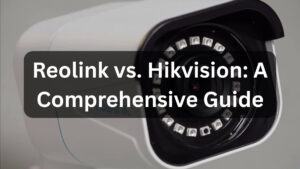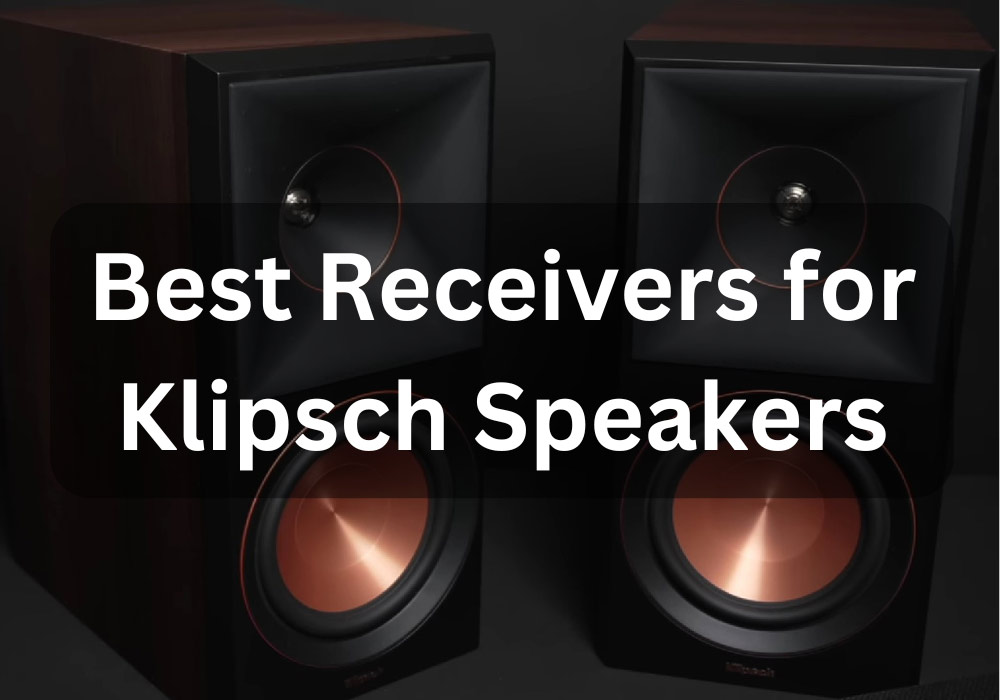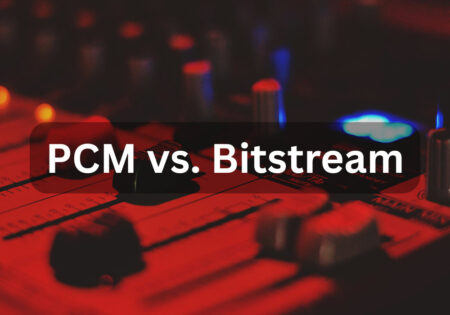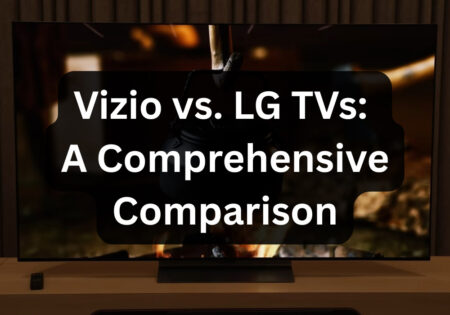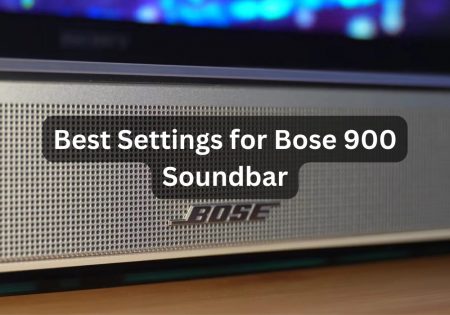Finding the best receivers for Klipsch speakers is crucial for getting the most out of them. Since Klipsch speakers come with high sensitivity, you don’t need one of those expensive beasts with super-high power output to give your speakers a good kick. In this article, I’ll review the best AV receivers for Klipsch speakers in 2024 across various price ranges and mention some useful tips for optimizing your home theater setup.
What Are the Best Receivers for Klipsch Speakers? (Quick Answer)
These are the best AV receivers you can buy for you Klipsch speakers:
- Denon AVR-S760H (Jump to review)
- Denon AVR-X3700H (Jump to review)
- Anthem MRX-1140 (Jump to review)
| Receiver | Price Range | Power Output | Channels | Room Calibration | Supported Resolutions | 3D Audio Formats | Pros | Cons |
|---|---|---|---|---|---|---|---|---|
| Denon AVR-S760H | $400 – $800 | 75W per channel | 7.2 | Audyssey MultEQ | 8K/60Hz, 4K/120Hz | Dolby Atmos, DTS | Affordable, HEOS multi-room feature, great video support for price | Limited power for large rooms, no pre-outs |
| Denon AVR-X3700H | $900 – $1500 | 105W per channel | 9.2 | Audyssey MultEQ XT32 | 8K/60Hz, 4K/120Hz (1 input) | Dolby Atmos, DTS, IMAX Enhanced | Strong power output, flexible channels for larger setups, high-quality calibration | Only one HDMI 2.1 input |
| Anthem MRX 1140 | $3500+ | 140W per channel | 11.2 | ARC Genesis Room Correction | 8K/60Hz, 4K/120Hz (7 inputs) | Dolby Atmos, DTS, IMAX Enhanced | Extensive HDMI inputs, very powerful, industry-leading room correction technology | Expensive, lacks built-in streaming |
Why Klipsch Speakers Are Special?
It’s their high sensitivity and low power requirements that make them special. As I already mentioned, Klipsch speakers are designed with high sensitivity.
A speaker’s sensitivity refers to how efficient it is in converting power into sound. Most Klipsch models have a sensitivity of 98dB or higher, while the industry standard is around 88dB. In other words, for every watt of power, Klipsch speakers produce more sound.
So, what does this mean for the listener? It means these speakers can produce powerful sound with relatively low wattage, making it possible to drive them effectively without having to invest in a massive AV receiver. A mid-powered receiver is enough to get clear and crisp sound from Klipsch speakers.
Do All Klipsch Speakers Need a Receiver?
No, not all of them need a receiver. This depends on whether you have passive or powered Klipsch speakers.
Some powered models, like the Klipsch The Fives or Klipsch R-51PM, have built-in amplification, so they don’t need an external receiver. These models can directly connect to your audio source without requiring external amplification.
On the other hand, if you have passive Klipsch speakers, like the Reference and Reference Premiere series, you do need a receiver because these models lack built-in amplification.
Best Receiver for Klipsch Speakers: In-Depth Reviews
Denon AVR-S760H: Best Budget Receiver for Klipsch Speakers ($400 – $800)
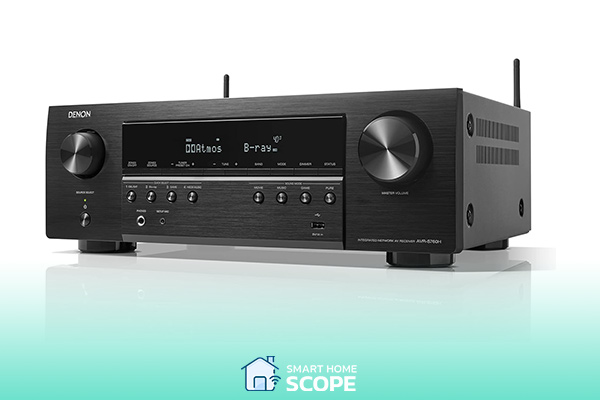
The Denon AVR-S760H is one of the best Denon AV receivers you can buy for such an affordable price. This receiver supports 7.2 channels and offers 75 watts per channel of power output—not overwhelming, but ideal for Klipsch speakers.
If you’re also looking for a receiver with recognizable video features like 8K pass-through at 60Hz and 4K at 120Hz, you’d be surprised that a budget device like the S760H offers them. Additionally, the S760H supports surround sound formats like Dolby Atmos and DTS.
Another interesting thing about this receiver is its support for the multi-room feature through HEOS, meaning you can play different audio sources in different rooms at the same time.
For sound calibration, this device benefits from Audyssey MultEQ room calibration technology, which provides solid performance in adjusting audio to your room’s acoustics.
Why It’s Great for Klipsch Speakers
- 7.2 Channel Support: At an affordable price, having a 7.2 channel receiver is a smarter choice than one that supports 5.2 channels, allowing you to expand your setup for future surround sound setups.
- 8K Support: With its 8K resolution support, this receiver will future-proof your setup.
- Supports 3D Audio Formats: The device supports DTS and Dolby Atmos to provide a more immersive sound.
- HEOS Built-In: You can stream music wirelessly to multiple rooms and integrate easily with your smart home setup—a big benefit.
- Audyssey MultEQ Calibration: No need for manual fine-tuning; it can automatically adjust sound settings according to your room’s acoustics.
What are the Downsides of the Denon AVR-S760H?
- Limited Power: The power output is 75 watts per channel, which is enough for most Klipsch setups but might not be ideal for larger rooms or if you upgrade speakers.
- No Pre-Outs: This model lacks pre-outs, limiting the option to add external amplifiers in the future.
Powered Klipsch speakers, such as The Fives, forgo the need for a receiver, whereas passive models like the Reference series necessitate one for external amplification
Denon AVR-X3700H: Best Mid-Range Receiver for Klipsch Speakers ($900 – $1500)
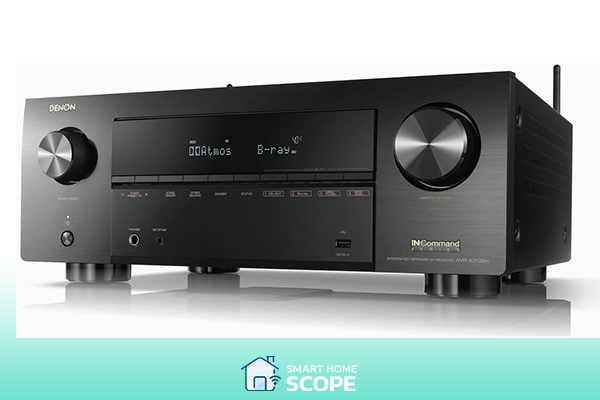
The Denon AVR-X3700H is a solid choice if you’re looking for a mid-range receiver. It’s a powerful combo of features and performance and pairs perfectly with Klipsch speakers.
This receiver supports 9.2 channels and provides 105 watts per channel, which is more than enough for Klipsch’s highly efficient speakers.
Just like the S760H, it supports DTS and Dolby Atmos for surround sound and adds IMAX Enhanced. Although IMAX Enhanced is nice, keep in mind that compatible content can be limited.
For video performance, the receiver includes 8K/60Hz and 4K/120Hz passthrough, but unlike the S760H, it only offers one HDMI input for these formats.
The room calibration technology here is Audyssey MultEQ XT32, which adjusts sound with more precision than MultEQ. For me, the difference is night and day.
Why It’s Great for Klipsch Speakers
- 105 Watts Per Channel: This power output is more than enough for Klipsch speakers, ensuring clear and dynamic sound even at high volumes.
- 9.2 Channels Support: This makes the device flexible for larger home theater setups, like Dolby Atmos or 7.2.2 configurations.
- Audyssey MultEQ XT32: Improved calibration tech ensures sound is optimized for your room’s acoustics.
- 8K and 4K/120Hz Support: Like the S760H, this model supports the latest video standards. While the S760H has three inputs for 8K/60Hz and 4K/120Hz, this model has just one.
- IMAX Enhanced: A feature that boosts video and audio quality, offering a cinema-like experience, though content availability varies.
What are the Downsides of the Denon AVR-X3700H?
Compared to the budget-friendly Denon S760H, which offers three HDMI 2.1 inputs, the AVR-X3700H includes only one. This HDMI 2.1 input enables 4K/120Hz and 8K passthrough, meaning that with more HDMI 2.1 inputs, you could connect multiple high-resolution devices to your receiver for 8K or 4K/120Hz content.
Also Read:
Denon vs Onkyo
Anthem MRX 1140: Best Premium Receiver for Klipsch Speakers ($3500+)
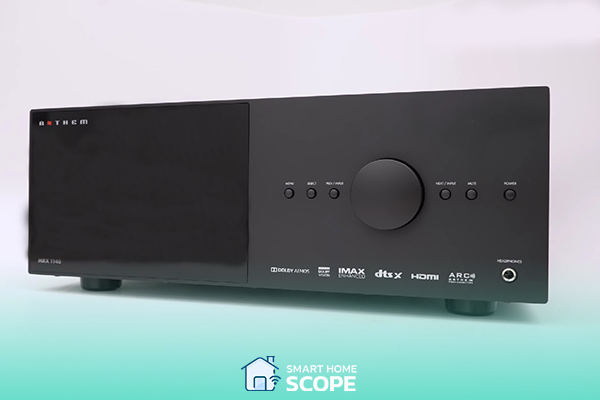
If you want to go further, a powerhouse like the Anthem MRX 1140 is surely the way to go. With its massive 140 watts per channel and 11.2 channels, it pairs incredibly well with your Klipsch speakers. This amount of power is more than enough to fill even the largest room with fantastic sound.
If there’s one thing that really stands out about this beast, it’s the industry-leading ARC Genesis Room Correction technology. This calibration tech is very precise in adjusting the sound—definitely beats Audyssey—with every note perfectly balanced.
Why It’s Great for Klipsch Speakers
- 140 watts per channel: This is plenty of power for your Klipsch speakers, ensuring clear sound even at high volumes.
- 11.2 channels: Perfect for larger home theater setups or advanced Dolby Atmos configurations.
- ARC Genesis Room Correction: Smart calibration technology, among the best, to make sure you get the best sound from your Klipsch speakers.
- 8K and 4K/120Hz support: With 7 HDMI 2.1 ports, you’ve got more connectivity than you’ll probably need, perfect for gaming consoles and other high-res devices!
- 3D Formats Support: Supports DTS and Dolby Atmos for a 3D sound experience.
- IMAX Enhanced: Adds clarity and an elevated experience for video and audio.
What are the Downsides of the Anthem MRX 1140?
- Pricey: Unless you have a large home theater, a powerhouse like this may not be necessary, especially with high-sensitivity speakers like Klipsch.
- No built-in streaming: Even though this is a high-end model, it doesn’t have built-in streaming like HEOS or Chromecast.
The Anthem MRX 1140 is a formidable powerhouse, delivering 140 watts per channel across 11.2 channels, harmoniously enhancing Klipsch speakers and enveloping expansive spaces in exquisite sound
Do Klipsch Speakers Need a Subwoofer?
Yes, a subwoofer can be an essential part of your setup. You might go with one or even two subwoofers depending on your setup’s size. Subwoofers give a fuller sound, adding depth and richness to your audio, especially in lower frequencies, making your experience more immersive. Below are some top subwoofers that pair well with Klipsch speakers.
Top Subwoofers for Klipsch Speaker Systems
SVS SB-1000 Pro
The SVS SB-1000 Pro brings a punchy bass to your Klipsch speakers with its 325-watt RMS amplifier and 12-inch driver, handling deep lows without distortion.
Monolith M-10 V2
This model is a true beast! With a 500-watt amplifier and a 10-inch woofer, it delivers punchy, room-shaking bass! Not only powerful, it pairs well with Klipsch’s clear mid and high frequencies.
HSU VTF-MK5
One unique thing about this subwoofer is its adjustable port tuning to suit your room and preferences. With a 12-inch driver and a 250-watt amplifier, it offers solid bass, and the tweaking feature is excellent for challenging acoustics.
Conclusion
These are the best receivers for Klipsch speakers. Choosing the right AV receiver can truly elevate the sound experience from your Klipsch speakers. It depends on your setup’s needs, so look for a receiver with enough channels, suitable power output, and features like Dolby Atmos and good room calibration.
FAQs
How Do I Connect My Klipsch Speakers to My Receiver?
Just match the positive (red) and negative (black) terminals on both the receiver and speakers.
Why Do Klipsch Speakers Sound So Good?
Since they’re highly efficient, they produce less distortion. This efficiency, paired with “Klipsch’s Law,” makes their sound so clean, accurate, and satisfying.
Can I Use Any Receiver with My Klipsch Speakers?
Yes, but keep in mind that Klipsch speakers are highly sensitive, meaning they don’t need high-powered receivers for great sound. Just make sure the receiver’s impedance matches the speaker’s.
